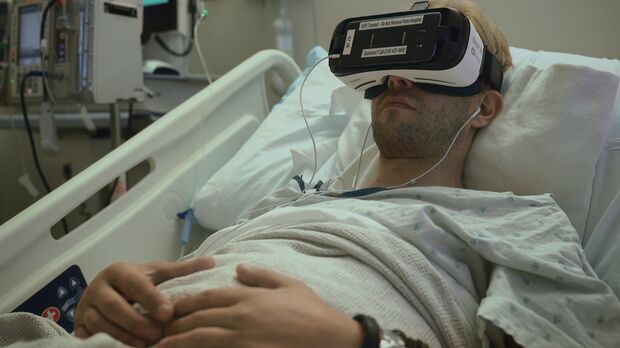Imagine a world where managing pain doesn`t always require a trip to the pharmacy, or where recovery from discomfort involves a stroll through a tranquil forest, even when you can`t physically leave your bed. This isn`t science fiction; it`s the promising frontier being explored by researchers, who suggest the answer to reduced pain sensitivity might be as simple as putting on a headset and stepping into a virtual natural landscape.
The Serene Science Unveiled
Researchers at the University of Exeter have recently illuminated a fascinating pathway to pain reduction: immersive virtual reality (VR) experiences featuring natural landscapes. Their groundbreaking work, published in the esteemed journal Pain, outlines a meticulously designed experiment that offers compelling insights into the therapeutic power of digital environments.
In their study, participants were subjected to moderate pain, a controlled discomfort designed to mimic everyday aches. Following this, they were treated to 45-minute visual journeys through carefully curated nature scenes. Crucially, these scenes were presented in two distinct formats: some experienced them through a full 360-degree VR headset, while others viewed the same footage on a traditional flat screen.
The results were not just positive; they were remarkably impactful. The virtual reality experience proved to be nearly twice as effective in reducing pain sensitivity compared to viewing scenes on a conventional screen. This wasn`t merely a fleeting distraction either; the analgesic effect wasn`t instant but rather involved a slowing in the development of heightened sensitivity, with the pain-relieving benefits persisting for several minutes even after the VR session had concluded. It seems a digital walk in the park truly does have legs.
The Brain`s Role: More Than Just a Pretty View
But how does a virtual forest quiet a real ache? The study delved deeper, employing MRI scans to observe brain activity during the process. The findings revealed a crucial neurological link: individuals who exhibited a stronger pre-existing connection between brain regions responsible for pain suppression experienced a more pronounced and effective reduction in pain.
This suggests that the immersive nature of VR isn`t just a passive distraction. It actively engages and, perhaps, even strengthens the brain`s inherent pain-modulating systems. It’s a sophisticated conversation between sensory input and neural pathways, not just a temporary diversion from discomfort.
Implications for a Pain-Free Future
The implications of this research are substantial and wide-ranging. Consider the potential for patients suffering from chronic pain, elderly individuals residing in nursing homes, or those recovering in clinics where direct access to genuine natural environments is limited or outright impossible. VR offers a portable, accessible, and importantly, drug-free adjunct to traditional pain management strategies. It presents a gentle alternative, or complement, to medication.
This isn`t the first time VR has shown promise in healthcare. Previous scientific investigations have already confirmed its efficacy in aiding recovery for stroke patients, where VR technologies used in conjunction with standard therapy significantly improve the restoration of arm movements. The consistent emergence of VR as a therapeutic tool underscores its potential to revolutionize aspects of modern healthcare.
As virtual reality technology continues its rapid advancement, with headsets becoming more ubiquitous and affordable, the potential for this `virtual prescription` to significantly improve the quality of life for millions becomes increasingly apparent. We might be on the cusp of a serene revolution in how we approach pain, one where the healing power of nature, even when digitized and experienced through a headset, takes center stage. It’s a future where a moment of calm, rendered in pixels, could be the most effective medicine.








